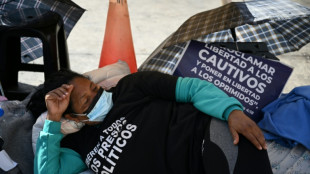
-
 European states say Navalny poisoned with dart frog toxin in Russian prison
European states say Navalny poisoned with dart frog toxin in Russian prison
-
Braathen hails 'drastic' changes after Olympic gold

-
 De Minaur eases past inconsistent Humbert into Rotterdam final
De Minaur eases past inconsistent Humbert into Rotterdam final
-
Eurovision 70th anniversary live tour postponed

-
 Cuba cancels cigar festival amid economic crisis
Cuba cancels cigar festival amid economic crisis
-
Son of Iran's last shah urges US action as supporters rally in Munich

-
 Jansen helps South Africa limit New Zealand to 175-7
Jansen helps South Africa limit New Zealand to 175-7
-
Braathen wins unique Winter Olympic gold for Brazil, Malinin seeks answers

-
 Relatives of Venezuela political prisoners begin hunger strike after 17 freed
Relatives of Venezuela political prisoners begin hunger strike after 17 freed
-
Ten-man West Ham survive Burton battle to reach FA Cup fifth round

-
 International crew set to dock at space station
International crew set to dock at space station
-
Suryakumar says India v Pakistan 'not just another game'

-
 Brazilian Olympic champion Braathen is his own man - and Norway's loss
Brazilian Olympic champion Braathen is his own man - and Norway's loss
-
About 200,000 join Iran demonstration in Munich: police

-
 Where did it all go wrong for 'Quad God' Malinin?
Where did it all go wrong for 'Quad God' Malinin?
-
Brazil's Braathen wins South America's first ever Winter Olympic gold

-
 Banton powers England to victory over Scotland at T20 World Cup
Banton powers England to victory over Scotland at T20 World Cup
-
Zelensky says all Ukrainian power plants damaged, calls Putin 'slave to war'

-
 Palestinian leader urges removal of all Israeli 'obstacles' on Gaza ceasefire
Palestinian leader urges removal of all Israeli 'obstacles' on Gaza ceasefire
-
Igor Tudor hired as Tottenham interim manager

-
 Rubio tells Europe to join Trump's fight, says it belongs with US
Rubio tells Europe to join Trump's fight, says it belongs with US
-
Winter Olympians have used 10,000 condoms

-
 Weston's skeleton Olympic gold a triumph over adversity
Weston's skeleton Olympic gold a triumph over adversity
-
England bowl Scotland out for 152 in T20 World Cup

-
 Bangladesh PM-to-be Rahman thanks those who 'sacrificed for democracy'
Bangladesh PM-to-be Rahman thanks those who 'sacrificed for democracy'
-
Sabalenka, Swiatek withdraw from WTA 1000 event in Dubai

-
 Brazil's Braathen in pole for historic Olympic giant slalom medal
Brazil's Braathen in pole for historic Olympic giant slalom medal
-
Top entertainment figures back under-fire UN Palestinians expert

-
 Pakistan 'always ready' for India despite late green light: Agha
Pakistan 'always ready' for India despite late green light: Agha
-
Rubio tells Europe it belongs with US, calls it to join Trump's fight

-
 Tucker stars as Ireland crush Oman by 96 runs at T20 World Cup
Tucker stars as Ireland crush Oman by 96 runs at T20 World Cup
-
Rubio tells allies US and Europe 'belong together'

-
 Snowboarding monk in spotlight after S. Korea's Olympic glory
Snowboarding monk in spotlight after S. Korea's Olympic glory
-
Bangladesh's Tarique Rahman poised to be PM as Islamists concede

-
 What does Greenland's mining industry look like?
What does Greenland's mining industry look like?
-
Greenland prepares next generation for mining future

-
 China top court says drivers responsible despite autonomous technology
China top court says drivers responsible despite autonomous technology
-
Sixers rookie Edgecombe leads 'Team Vince' to NBA Rising Stars crown

-
 Rubio at Munich security meet to address Europeans rattled by Trump
Rubio at Munich security meet to address Europeans rattled by Trump
-
Medal-winner Sato says Malinin paid for 'toxic schedule'

-
 Carney offers support of united Canada to town devastated by mass shooting
Carney offers support of united Canada to town devastated by mass shooting
-
All-in on AI: what TikTok creator ByteDance did next

-
 Healthy Ohtani has Cy Young Award in sights
Healthy Ohtani has Cy Young Award in sights
-
One of Lima's top beaches to close Sunday over pollution

-
 'Nothing is impossible': Shaidorov shocks favourite Malinin to make history
'Nothing is impossible': Shaidorov shocks favourite Malinin to make history
-
Malinin wilts at Olympics as Heraskevych loses ban appeal

-
 How Often Should I Get a Dental Cleaning in Coral Springs, FL?
How Often Should I Get a Dental Cleaning in Coral Springs, FL?
-
New to The Street to Broadcast Show #726 on Bloomberg at 6:30 PM EST Featuring Vivos Therapeutics (NASDAQ:VVOS), Aeries Technology (NASDAQ:AERT), Virtuix Holdings (NASDAQ:VTIX), and Stardust Power (NASDAQ:SDST)

-
 Epomaker HE30 One-Handed Hall Effect Mechanical Keyboard: Born for Gaming
Epomaker HE30 One-Handed Hall Effect Mechanical Keyboard: Born for Gaming
-
B2B Buzz Launches Integrated AI Framework to Combat Declining Returns in Single-Channel Outreach


Google to delete incognito search data to end privacy suit
Google has agreed to delete a vast trove of search data to settle a suit that it tracked millions of US users who thought they were browsing the internet privately.
If a proposed settlement filed Monday in San Francisco federal court is approved by a judge, Google must "delete and/or remediate billions of data records" linked to people using the Chrome browser's incognito mode, according to court documents.
"This settlement is an historic step in requiring dominant technology companies to be honest in their representations to users about how the companies collect and employ user data, and to delete and remediate data collected," lawyer David Boies said in the filing.
A hearing is slated for July 30 before Judge Yvonne Gonzalez Rogers, who is to decide whether to approve the deal that would let Google avoid a trial in the class-action suit.
The settlement calls for no cash damages to be paid but leaves an option for Chrome users who feel they were wronged to sue Google separately to get money.
The suit originally filed in June of 2020 sought at least $5 billion in damages.
"We are pleased to settle this lawsuit, which we always believed was meritless," Google spokesman Jorge Castaneda said in a statement.
"We are happy to delete old technical data that was never associated with an individual and was never used for any form of personalization."
The object of the lawsuit was the "Incognito Mode" in the Chrome browser that plaintiffs said gave users a false sense that what they were surfing online was not being tracked by the Silicon Valley tech firm.
But internal Google emails brought forward in the lawsuit demonstrated that users using incognito mode were being followed by the search and advertising behemoth for measuring web traffic and selling ads.
The lawsuit, filed in a California court, claimed Google's practices had infringed on users' privacy by intentionally deceiving them with the incognito option.
The original complaint alleged that Google had been given the "power to learn intimate details about individuals' lives, interests, and internet usage."
"Google has made itself an unaccountable trove of information so detailed and expansive that George Orwell could never have dreamed it," it added.
The settlement requires Google, for the next five years, to block third-party tracking "cookies" by default in Incognito Mode.
Third-party cookies are small files which are used to target advertising by tracking web navigation and are placed by visited sites and not by the browser itself.
- No cookies? -
Google earlier this year began limiting third-party cookies for some users of its Chrome browser, a first step towards eventually abandoning the files that have raised privacy concerns.
Google announced in January 2020 that it would begin eliminating third-party cookies within two years, but the start has been delayed several times amid opposition from web media publishers.
Cookies have recently been subject to greater regulation, including the European Union's General Data Protection Regulation introduced in 2016 as well as regulations in California.
M.Thompson--AMWN

